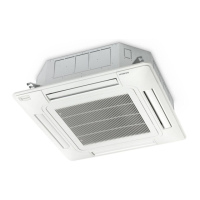6 Commissioning
Checks prior to the test run
SMGB0137 rev.0 - 05/2021
176
6.1 Checks prior to the test run
• Once installation is complete, carry out the test run in line with the procedure described below. The system can be
handed over to the client once the test has been correctly completed.
• Prior instructions to carry out the test run:
1 Verify the check points described in Check points.
2 Carry out the check procedure described in Check procedure.
3 Carry out the test run on the indoor units individually and in order.
4 Check that the wiring and refrigerant piping connections are connect.
5 Start the indoor units individually and in order. Check that they are correctly numbered.
6 Carry out the test in line with the instructions given in section Test procedure using the remote control.
! CAUTION
• Bearthefollowinginmindwhilethesystemisrunning:
- Donottouchanycomponentinthedischargegasarea.Thecompressorchamberandthepipingareattemperaturesofover
90ºC.Theymaycauseburns.
- Donottouchthemagneticbreakers.Thiscouldcauseaseriousaccident.
• Waitformorethanthreeminutesbeforetouchingelectricalcomponentsafterturningothemainswitch.
• Checkthatthegasandliquidlinestopvalvesarefullyopen.
6.1.1 Check points
• Donotstartthesystemuntilallofthecheckpointshavebeenveried.
1 Use a multimeter to measure the resistance between earth and the electrical component terminal. Check that the
resistanceisabove1MΩ.Otherwise,donotstartthesystem,locatetheelectricalleakandrepair.Donotapply
voltage to transmission terminals 1 and 2.
2 Check that the outdoor unit stop valves are fully open. If so, start the system.
3 Check that the power supply switch has been on for over 12 hours to heat up the compressor oil.
6.1.2 Check procedure
Check:
1 The gas and liquid line stop valves are fully open.
2 That there are no refrigerant leaks.
? NOTE
Flarenutsmaysometimesloosenduetovibrationsduringtransportation.
3 Refrigerant piping and wiring form part of the same system.
4 The setting of the DIP switches on the printed circuit board of the indoor units is correct. Pay particular attention to
thesetdierentinheightbetweentheindoorandoutdoorunits.Seethewiringdiagramsforfurtherdetails.
5 The power supply switch has been on for over 12 hours to heat up the compressor oil.
6 The wiring is correctly connected. See the wiring diagrams for further details.
7 Each terminal (L1, L2, L3, N or L1 and N) is correctly connected to the power supply.
8 Theeld-suppliedelectriccomponents(mainpowerswitchprotectionfuse,circuitbreakerwithoutfuse,residual
current breaker, wires, piping connectors and wire terminals) have been selected correctly in line with the electrical
data given in the technical catalogue and in national and local regulations.
9 The power supply wiring terminal connection (L1 to L1 and N to N). Check the connection of the terminal boards
running at 380 Vac. An incorrect connection may damage components.
10 Intermediatewireterminalsbetweentheindoorunit(operationalline:terminalsofeveryterminalboardfor12V)t
correctly. An incorrect connection may damage components.
11 The crankcase checker has been on for more than four hours. The device will not work unless it has been on for
more than four hours.

